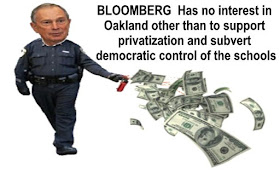Three Billionaires Are Trying to Buy the School Board in Oakland, California
We keep reading this story in district after district, state after state, but we should not stop being outraged. There ought to be a law that prevents fabulously wealthy people from buying state and local school board elections. We know that their goal is not to improve the schools but to privatizatize them.
In Oakland, California, the privatizing organization is called Great Oakland public schools, and it has the chutzpah to call itself a “grassroots campaign.” It has raised half a million or so for pro-charter candidates. $300,000 came from billionaire Michael Bloomberg, former mayor of New York City. Most of the rest came from two other billionaires, who have no interest in Oakland other than to support privatization and subvert democratic control of the schools.
Here is the story:
“If it were just a matter of raising money from parents, teachers, and community members, then school-board candidates James Harris, Huber Trenado, and Jumoke Hinton Hodge’s financial advantage over their opponents would be minimal. For example, the incumbent board chairman Harris has raised $11,836 from individual contributors for his re-election this year. That’s not much more than Chris Jackson, his challenger, who has scraped together $9,622.
“But Harris, Trenado, and Hinton Hodge benefit from two independent-expenditure committees funded by super-wealthy charter-school advocates, which have raised millions since 2014.
“These committees are on track to spend about half-a-million dollars to help Harris and Hinton Hodge keep their seats on the board, and to help Trenado unseat Roseann Torres.
“Critics worry, however, that this “outside money” distorts Oakland’s school-board races.
“It’s shocking to me how much they’re spending to get these specific candidates elected,” said Kim Davis, a parent whose kids attend Oakland public schools. “This is not a level playing field. More money means more mailers, more people knocking on doors, and more people making phone calls.”
“Gonzales, who was elected to the school board in 2014 to represent District Six, noted that a “typical school board race in years past was one where a candidate wouldn’t have to raise more than twenty-thousand, max.”
“But in 2012, Gonzales says the nonprofit organization Great Oakland Public Schools began raising and spending tens of thousands of dollars to support candidates who will advance its goals of growing the number of charters and providing them with greater access to publicly-funded resources. As a result, GO Public Schools changed the calculus of school-board elections and unleashed an avalanche of money, which other groups haven’t matched, and that dwarfs the sums that candidates can raise by themselves.
“They have relationships with corporate titans all over the country,” Gonzales said of GO Public Schools. “That’s why the school board has become a much more high-dollar affair.”
“According to campaign-finance records, the two committees supporting Harris, Trenado, and Hinton Hodge received most of their funding from a few billionaires, who have played key roles backing the charter-school industry.
“So far, the two committees — Families and Educators for Public Education, which was set up by GO Public Schools, and the Parent Teacher Alliance, run by the California Charter Schools Association — have spent $421,906 to support Harris, Trenado, and Hinton Hodge.
“The result is that, for every dollar spent to support Jackson, $17 have been spent to support Harris.”
Will the people of Oakland allow the billionaires to buy their school board? Or will they fight to keep their public schools public?
A loss for Bloomberg won’t hurt him. A donation of $300,000 from him is equivalent to one of us dropping a dollar in a Salvation Army bucket. But if he loses again and again, whether in Oakland or in Massachusetts, he might lose interest.


